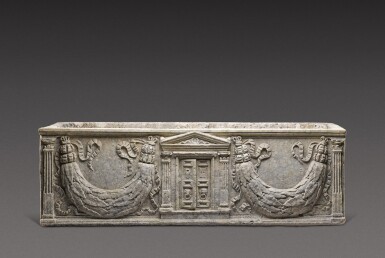Ancient Sculpture and Works of Art Part I
Ancient Sculpture and Works of Art Part I

Another Property
A Roman Marble Garland and "Gates of Hades" Sarcophagus, 3rd century A.D.
Auction Closed
December 7, 04:32 PM GMT
Estimate
50,000 - 70,000 GBP
Lot Details
Description
Another Property
A Roman Marble Garland and "Gates of Hades" Sarcophagus
3rd century A.D.
carved in relief in front with a paneled double door, shown ajar and fitted with locks and lion handles, within an aediculum composed of two fluted pilasters supporting an architrave and triangular pediment decorated with a wreath, a large garland of laurel leaves and berries tied with floating ribbons on either side, a fluted pilaster at each end, each short side carved in shallow relief with a large circular shield against two crossed oval shields and spears.
68.5 by 216 by 69 cm.
Sir John Charles Robinson (1824-1913), C.B, F.S.A., Newton Manor, Swanage, Dorset, acquired between 1852 and 1869 (his estate sale, conducted on the premises: Henry Duke & Son of Dorchester, The Newton Manor Collection. Swanage, Dorset, September 1st-4th, 1913, no. 503, illus.)
acquired at the above sale by a member of the Rootes family, Ramsbury Manor, Wiltshire
estate of the late Marian, Lady Rootes, sold by the Rootes family, Ramsbury Manor, Wiltshire (Duke's Fine Art, Dorchester, Dorset, The Rootes Collection. Day Two, September 28th, 2012, no. 987, illus.)
acquired by the present owner at the above sale
Published
https://www.bbc.co.uk/news/uk-england-dorset-19878090
https://www.antiquestradegazette.com/news/2012/rediscovered-sarcophagus-takes-80000-at-dukes/
The present example is a unique example combining two usually separate types of sarcophagus decoration: the Hades door (Hadestür) motif on the one hand, usually flanked by strigillation (http://arachne.uni-koeln.de/item/objekt/29438) or portraits of the deceased (http://arachne.uni-koeln.de/item/objekt/6522), or both (http://arachne.uni-koeln.de/item/objekt/6991), and occasionally by panels of inscription (http://arachne.uni-koeln.de/item/objekt/17569), and swags of garlands on the other hand, typically held by erotes (http://arachne.uni-koeln.de/item/objekt/14353).
